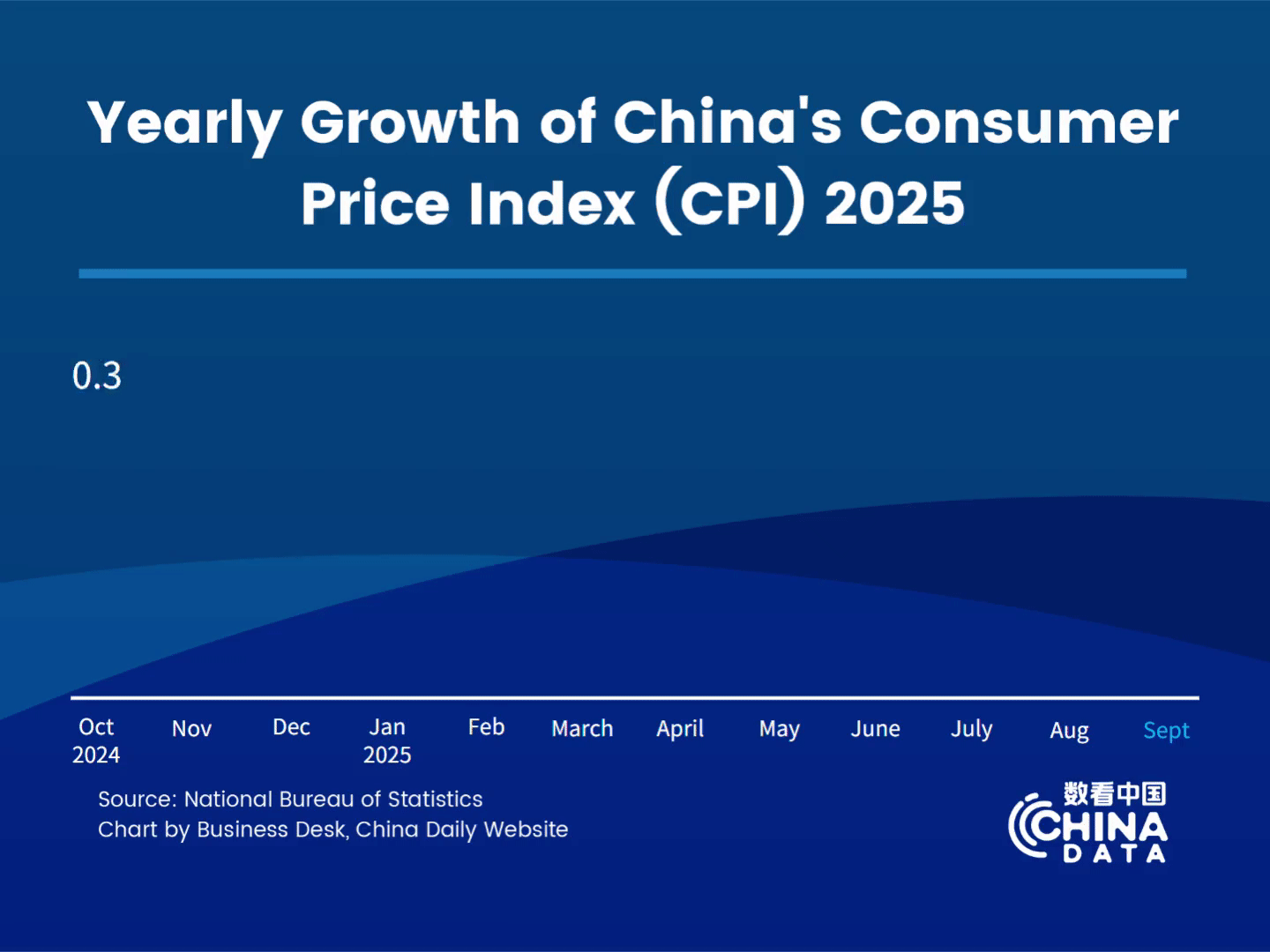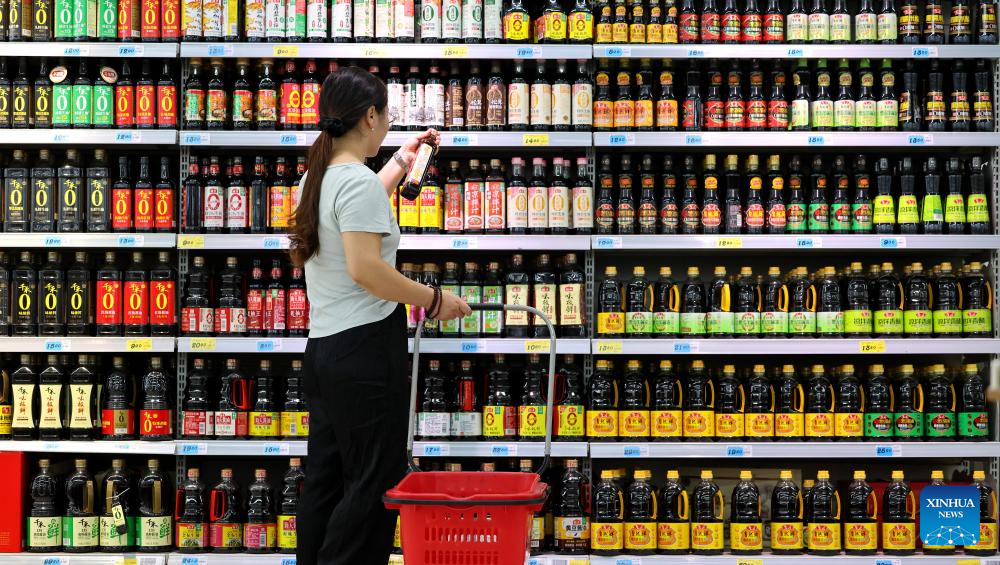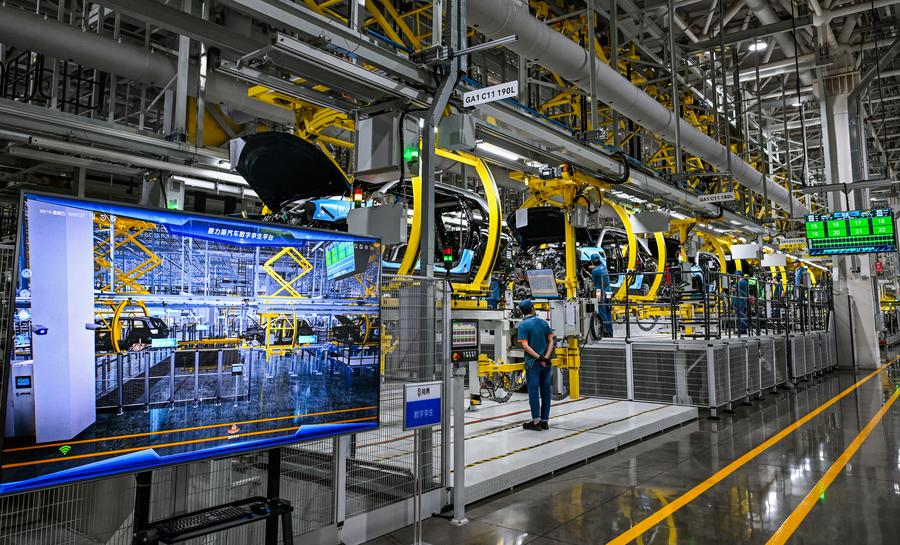
BEIJING - China's consumer prices showed further signs of stabilization in September, as core inflation reached its highest level in 19 months, underscoring a gradual strengthening in domestic demand.
According to data released by the National Bureau of Statistics on Wednesday, the core consumer price index, which excludes food and energy prices, rose 1 percent year-on-year - marking the fifth consecutive month of acceleration and the biggest increase since February 2024.
Notably, gold jewelry prices surged 42.1 percent from a year ago, household appliances and items were up 5.5 percent, and communication devices increased by 1.5 percent. The costs of medical and domestic services climbed 1.9 percent and 1.6 percent, respectively.
The headline CPI also showed a positive trend - logging a 0.1 percent month-on-month increase from a flat August and narrowing its year-on-year decline to 0.3 percent - compared with a 0.4-percent drop in August.
The bureau's statistician Dong Lijuan attributed the year-on-year decrease in the headline CPI mainly to "base effects" from last year, emphasizing that the influence from this year's price changes has been positive.
"The consumer market remained broadly stable in September," Dong said.
These encouraging signs in consumer prices reflect a sustained recovery in domestic demand, supported by a raft of pro-consumption measures introduced this year.

The trade-in program for consumer goods, one of the major initiatives, has proved to be highly effective. From January to August, 330 million consumers claimed trade-in subsidies, driving over 2 trillion yuan ($280 billion) of sales in related products ranging from smartphones and home appliances to electric bicycles nationwide.
China recently allocated another 69 billion yuan to local governments to fund consumer-goods trade-ins, resulting in the full-year central funding of 300 billion yuan being completely disbursed.
In addition to goods consumption, services spending has also accelerated. The bureau's spokesperson Fu Linghui has noted that strong demand for travel and leisure activities has continued to drive service consumption this year.
During the eight-day National Day and Mid-Autumn Festival holiday in early October, domestic trips reached 888 million - up by 123 million from the seven-day holiday in 2024. Total domestic tourism spending rose to 809.01 billion yuan, an increase of 108.19 billion yuan from last year.
Meanwhile, experts also highlighted the rapid rise of new consumption trends - including digital, green and health-oriented spending, as emerging engines of growth. For instance, retail sales of new energy passenger vehicles grew by more than 20 percent in the first eight months of 2025.
Despite this consumption momentum, Fu acknowledged that price levels remain subdued, and consumer confidence and purchasing power still need strengthening.
Looking ahead, more efforts will be made to further implement special initiatives to boost consumption, promote stable employment and income growth, improve the consumption environment, and expand the supply of quality goods and services in a bid to unleash greater domestic demand, Fu said.
ALSO READ: China's consumer prices rebound amid pro-consumption policies

Meanwhile, China has witnessed signs of improvement in industrial prices in September as the decline in its producer price index, which measures costs for goods at the factory gate, continued to narrow, the bureau's data showed.
The PPI went down 2.3 percent year-on-year in September, the bureau said. The decline narrowed by 0.6 percentage points from the previous month, suggesting an improvement in industrial demand amid government efforts to bolster economic growth.
On a monthly basis, the PPI held steady in September after a 2.9 percent year-on-year decrease in August, the data revealed.
Improvements in the supply and demand structure led to a notable stabilization of prices in certain sectors in September, said the bureau's statistician Dong, who added that sectors including coal processing, ferrous metals smelting and rolling manufacturing, as well as photovoltaic equipment and component manufacturing, saw price growth last month.
In September, a decline in international oil prices led to month-on-month drops in prices in domestic oil-related sectors, according to Dong.
On a yearly basis, the continued effects of China's macroeconomic policies have driven positive price changes in some industries, Dong said, highlighting the positive roles played by the building of a unified national market, the upgrading of the industrial structure and pro-consumption policies.
PPI for the first nine months of the year was 2.8 percent lower compared with the same period in 2024.


